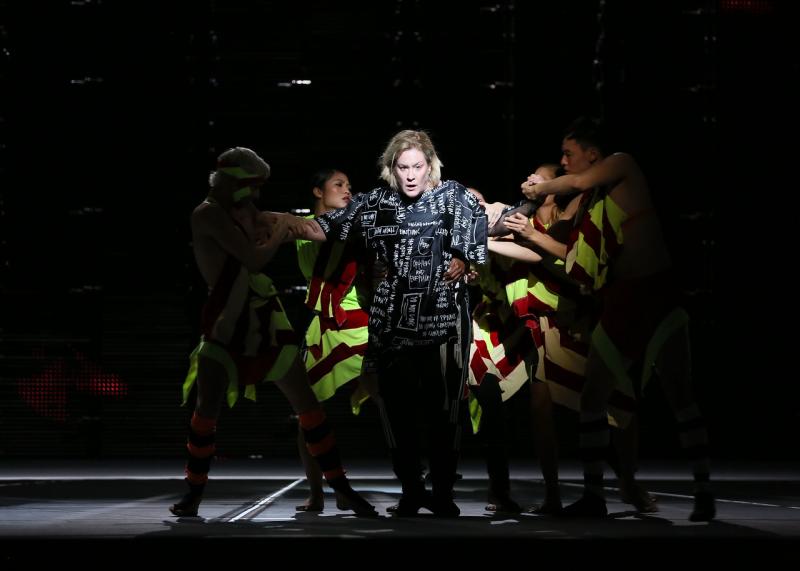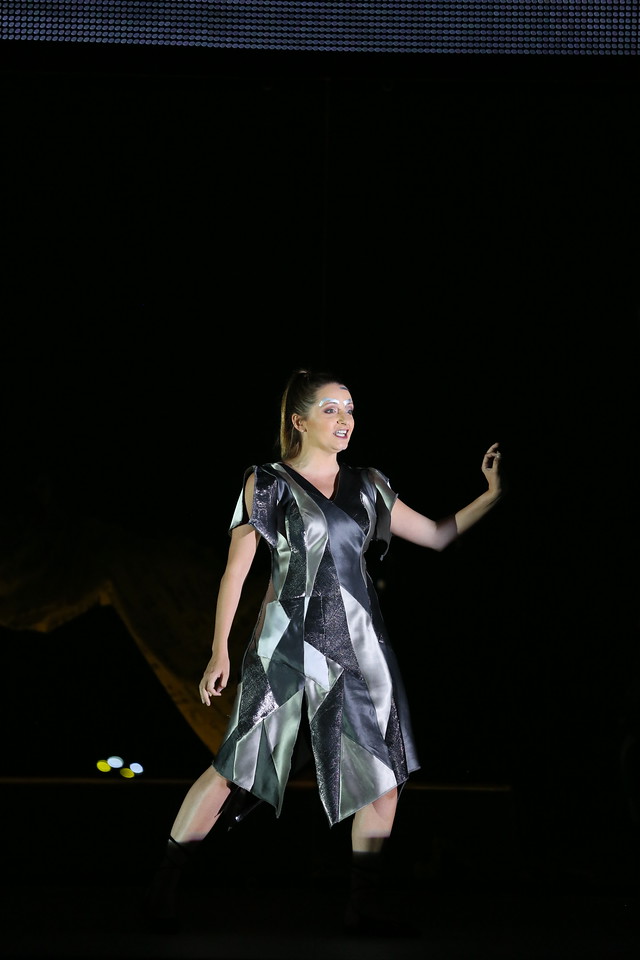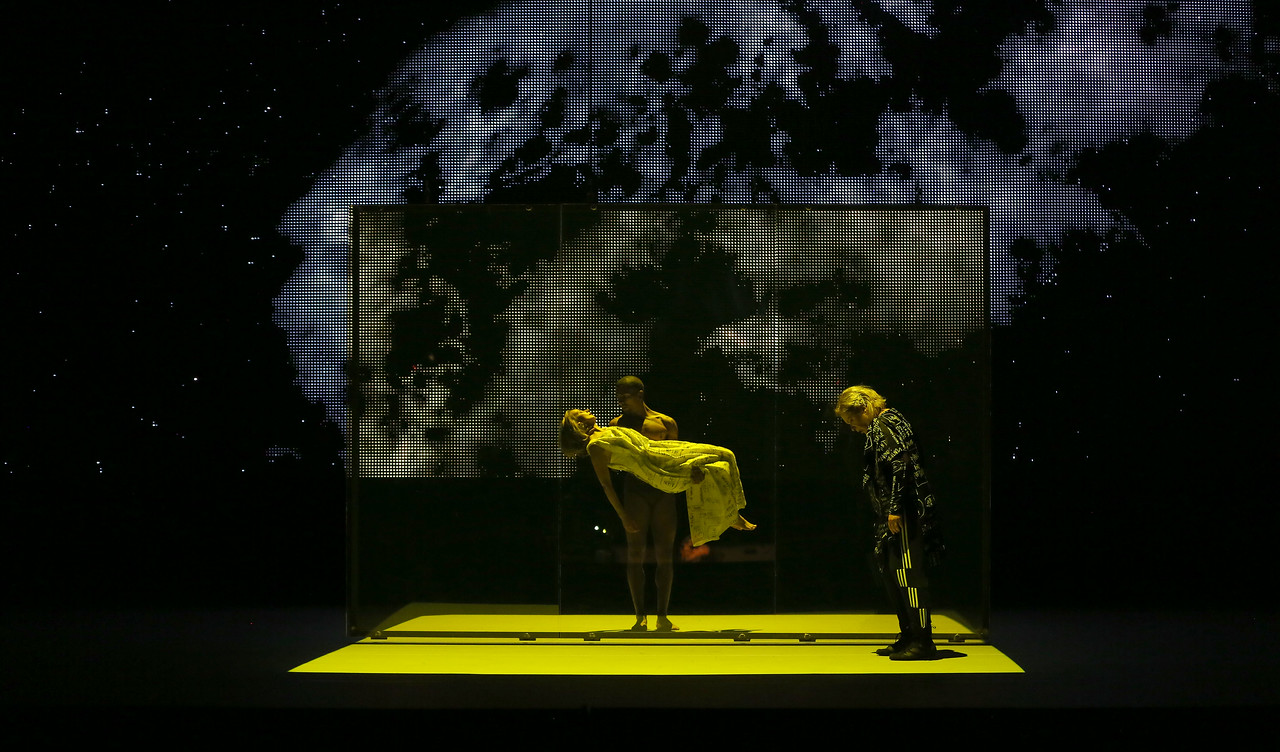Orpheus and Eurydice, English National Opera review – imaginative but underwhelming | reviews, news & interviews
Orpheus and Eurydice, English National Opera review – imaginative but underwhelming
Orpheus and Eurydice, English National Opera review – imaginative but underwhelming
Dance focus intrigues, but is let down by incoherent designs and modest musical offerings

English National Opera chose a curiously low-key production to open their season. Gluck’s Orpheus and Eurydice has only three singing roles and very little action. For this production, Wayne McGregor has reimagined the work as an opera/dance hybrid.
The opera itself contains many ballet numbers, so the dance element makes sense. And McGregor resists the temptation to have his troupe – 14 dancers in all – on stage throughout, instead focussing his energies on the Overture and the ballet sequences, especially in act III. Little about the dancing is narrative or literal, and physical interactions between dancers and singers are kept to a minimum. A sense of torment is powerfully portrayed at the threshold to the Underworld in act II, while the Dance of the Blessed Spirits in act III references the formality of Baroque ballet, though of course highly stylised. Orpheus is shadowed by a male dancer through much of the opera (Jacob O'Connell, pictured bottom), and in Act Four a dance double appears for Eurydice too, allowing for subtle interplay between the two couples in the final scene.
The sets (Lizzie Clachan) and costumes (Louise Gray) make less sense. To make room for the dancers, the chorus is banished to the orchestra pit and amphitheatre boxes – totally unnecessary given the size of the Coliseum stage. The stage backdrop is a coarsely pixelated screen, which regularly overwhelms the action with garish colours and strobe flashes. Shadow and silhouette effects are used to amplify the dance movement, but there is no consistency, and the dancers’ garish costumes conflict with the clean lines of the lighting design (Jon Clark). The most impressive piece of staging is Eurydice’s tomb in the first act, an iridescent box in which her body floats unsupported. Beautiful – just a shame the Royal Opera Parsifal got there first.
costumes (Louise Gray) make less sense. To make room for the dancers, the chorus is banished to the orchestra pit and amphitheatre boxes – totally unnecessary given the size of the Coliseum stage. The stage backdrop is a coarsely pixelated screen, which regularly overwhelms the action with garish colours and strobe flashes. Shadow and silhouette effects are used to amplify the dance movement, but there is no consistency, and the dancers’ garish costumes conflict with the clean lines of the lighting design (Jon Clark). The most impressive piece of staging is Eurydice’s tomb in the first act, an iridescent box in which her body floats unsupported. Beautiful – just a shame the Royal Opera Parsifal got there first.
Musically, the performance was serviceable, though none of the voices stood out. Alice Coote was suffering a serious viral infection, so allowances can be made. She looked under the weather, and struggled desperately for vocal stamina in the second half. Hopefully she will be in better health for the end of the run, but don’t be surprised to see an understudy between now and then. Sarah Tynan is a good fit for Eurydice, her singing always emotive, but her tone clear, if a little forced at the top. Soraya Mafi (pictured above right) is also a good choice as Love. Her voice is agile and well projected, and she has the stage presence and acumen to make all of her scenes work, despite every effort by the costume designer and the libretto translator to erode her credibility (example: “The rule is no speaking/remember no peeking”).  Harry Bicket conducts an energetic and lyrical account of Gluck’s score – here performed in Berlioz’s slightly meatier 1859 version. The chorus made the best of it from their perches, and having most of the singers in the pit brought valuable coherency to the chorus and orchestra sound. The orchestra itself lacked the classical poise and precision that Gluck’s music really needs to shine, but compensated with energy and vim, especially the perky woodwind solos in the instrumental numbers. But this remained a small production on a big stage, and while the dancing added an interesting addition to the modest musical offering, the choreography lacked dramatic substance and interpretive insight, at least from an operatic perspective. Economic considerations no doubt played a significant role in the decision to open the season on such a modest note; the results were imaginative, but underwhelming.
Harry Bicket conducts an energetic and lyrical account of Gluck’s score – here performed in Berlioz’s slightly meatier 1859 version. The chorus made the best of it from their perches, and having most of the singers in the pit brought valuable coherency to the chorus and orchestra sound. The orchestra itself lacked the classical poise and precision that Gluck’s music really needs to shine, but compensated with energy and vim, especially the perky woodwind solos in the instrumental numbers. But this remained a small production on a big stage, and while the dancing added an interesting addition to the modest musical offering, the choreography lacked dramatic substance and interpretive insight, at least from an operatic perspective. Economic considerations no doubt played a significant role in the decision to open the season on such a modest note; the results were imaginative, but underwhelming.
- Orpheus and Eurydice at English National Opera until 19 November
- Read more opera reviews on theartsdesk
rating
Explore topics
Share this article
The future of Arts Journalism
You can stop theartsdesk.com closing!
We urgently need financing to survive. Our fundraising drive has thus far raised £49,000 but we need to reach £100,000 or we will be forced to close. Please contribute here: https://gofund.me/c3f6033d
And if you can forward this information to anyone who might assist, we’d be grateful.

Subscribe to theartsdesk.com
Thank you for continuing to read our work on theartsdesk.com. For unlimited access to every article in its entirety, including our archive of more than 15,000 pieces, we're asking for £5 per month or £40 per year. We feel it's a very good deal, and hope you do too.
To take a subscription now simply click here.
And if you're looking for that extra gift for a friend or family member, why not treat them to a theartsdesk.com gift subscription?
more Opera
 Tosca, Welsh National Opera review - a great company reduced to brilliance
The old warhorse made special by the basics
Tosca, Welsh National Opera review - a great company reduced to brilliance
The old warhorse made special by the basics
 BBC Proms: The Marriage of Figaro, Glyndebourne Festival review - merriment and menace
Strong Proms transfer for a robust and affecting show
BBC Proms: The Marriage of Figaro, Glyndebourne Festival review - merriment and menace
Strong Proms transfer for a robust and affecting show
 BBC Proms: Suor Angelica, LSO, Pappano review - earthly passion, heavenly grief
A Sister to remember blesses Puccini's convent tragedy
BBC Proms: Suor Angelica, LSO, Pappano review - earthly passion, heavenly grief
A Sister to remember blesses Puccini's convent tragedy
 Orpheus and Eurydice, Opera Queensland/SCO, Edinburgh International Festival 2025 review - dazzling, but distracting
Eye-popping acrobatics don’t always assist in Gluck’s quest for operatic truth
Orpheus and Eurydice, Opera Queensland/SCO, Edinburgh International Festival 2025 review - dazzling, but distracting
Eye-popping acrobatics don’t always assist in Gluck’s quest for operatic truth
 MARS, Irish National Opera review - silly space oddity with fun stretches
Cast, orchestra and production give Jennifer Walshe’s bold collage their all
MARS, Irish National Opera review - silly space oddity with fun stretches
Cast, orchestra and production give Jennifer Walshe’s bold collage their all
 Káťa Kabanová, Glyndebourne review - emotional concentration in a salle modulable
Janáček superbly done through or in spite of the symbolism
Káťa Kabanová, Glyndebourne review - emotional concentration in a salle modulable
Janáček superbly done through or in spite of the symbolism
 Buxton International Festival 2025 review - a lavish offering of smaller-scale work
Allison Cook stands out in a fascinating integrated double bill of Bernstein and Poulenc
Buxton International Festival 2025 review - a lavish offering of smaller-scale work
Allison Cook stands out in a fascinating integrated double bill of Bernstein and Poulenc
 Tosca, Clonter Opera review - beauty and integrity in miniature
Happy surprises and a convincing interpretation of Puccini for today
Tosca, Clonter Opera review - beauty and integrity in miniature
Happy surprises and a convincing interpretation of Puccini for today
 Hamlet, Buxton International Festival review - how to re-imagine re-imagined Shakespeare
Music comes first in very 19th century, very Romantic, very French operatic creation
Hamlet, Buxton International Festival review - how to re-imagine re-imagined Shakespeare
Music comes first in very 19th century, very Romantic, very French operatic creation
 Falstaff, Glyndebourne review - knockabout and nostalgia in postwar Windsor
A fat knight to remember, and snappy stagecraft, overcome some tedious waits
Falstaff, Glyndebourne review - knockabout and nostalgia in postwar Windsor
A fat knight to remember, and snappy stagecraft, overcome some tedious waits
 Salome, LSO, Pappano, Barbican review - a partnership in a million
Asmik Grigorian is vocal perfection in league with a great conductor and orchestra
Salome, LSO, Pappano, Barbican review - a partnership in a million
Asmik Grigorian is vocal perfection in league with a great conductor and orchestra
 Semele, Royal Opera review - unholy smoke
Style comes and goes in a justifiably dark treatment of Handelian myth
Semele, Royal Opera review - unholy smoke
Style comes and goes in a justifiably dark treatment of Handelian myth

Add comment